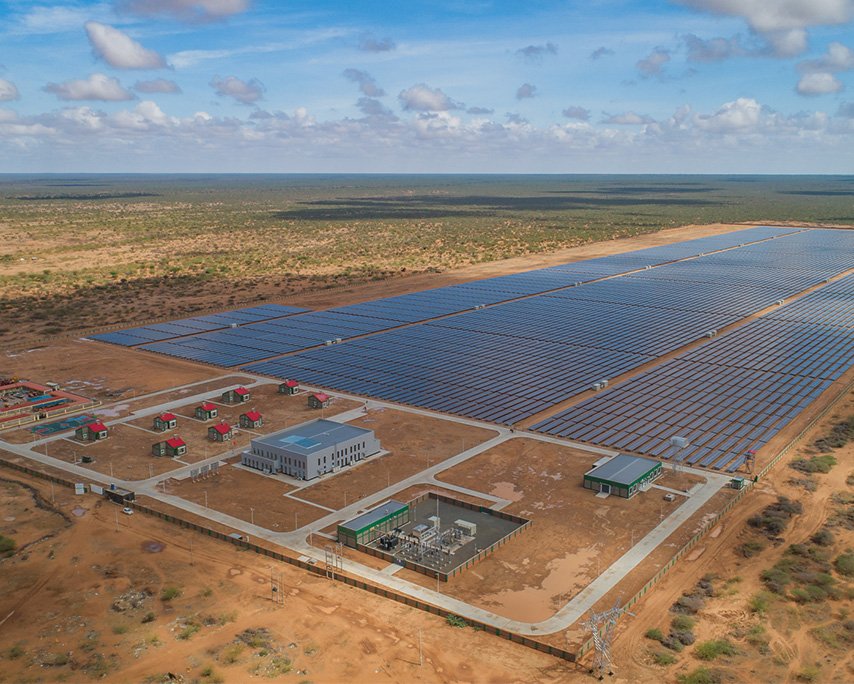Aerial view of a solar project in Garissa, Kenya
Photo credit: George Alusa
The role of publishers in clean energy advocacy
As we gear up to celebrate the International Day of Clean Energy on January 26th, it is a moment to reflect on the pivotal role clean energy plays in shaping our future. Clean energy is not merely a buzzword; it is a catalyst for social and economic development and environmental sustainability. On this day we remind ourselves of the profound connection between clean energy and its impact on achieving Sustainable Development Goals (SDGs). Furthermore, it is a day to explore the crucial role publishers play in propelling the world towards cleaner and more sustainable energy sources.
Clean energy, encompassing renewable sources like solar, wind, hydro and geothermal power, stands as a beacon of hope in the fight against climate change. Its significance lies not only in mitigating environmental degradation but also in fostering social and economic development.
Social economic development
Clean energy projects have the potential to drive job creation, improve public health and enhance overall well-being. As communities gain access to reliable and sustainable energy sources, opportunities for education, healthcare and entrepreneurship flourish. This, in turn, helps break the cycle of poverty and propels societies towards sustainable development.
Environmental sustainability
The environmental benefits of clean energy are profound. By reducing reliance on fossil fuels, we mitigate air and water pollution, decrease greenhouse gas emissions and contribute to the preservation of biodiversity. Clean energy technologies are instrumental in fostering a harmonious coexistence between humanity and the environment.
Clean energy and sustainable development goals
The United Nations’ Sustainable Development Goals provide a blueprint for a better and more sustainable future. Clean energy is interwoven with several of these goals, acting as a basis for achieving them:
SDG 7: Affordable and clean energy
Clean energy is the key player of SDG 7, aiming to ensure access to affordable, reliable, sustainable and modern energy for all. By investing in renewable sources, we move closer to universal energy access and pave the way for a more equitable world.
SDG 8: Decent work and economic growth
The clean energy sector is a growing industry that creates employment opportunities, fosters innovation and contributes to economic growth. Transitioning to a clean energy economy aligns seamlessly with the goals of sustainable economic development.
SDG 13: Climate action
Perhaps the most immediate and tangible impact of clean energy is its role in combating climate change. By reducing carbon emissions and promoting sustainable practices, clean energy is essential in achieving the objectives outlined in SDG 13.
Publishers, as disseminators of information and drivers of public discourse, play a fundamental role in advancing the clean energy agenda. They have the power to shape public opinion, influence policy decisions, and catalyse positive change through:
Raising awareness
Publishers must educate and inform the public about the benefits of clean energy, dispelling myths and fostering a greater understanding of its importance in achieving a sustainable future.
Advocacy and policy influence
By spotlighting clean energy initiatives and advocating for supportive policies, publishers encourage governments and businesses to invest in sustainable practices and technologies.
Showcasing innovations
Publishers can spotlight technological breakthroughs and innovative solutions within the clean energy sector, inspiring further research, development and investment.
As we celebrate this year’s International Day of Clean Energy, let us recognise the profound impact clean energy has on social, economic and environmental well-being. By understanding the interplay between clean energy and the Sustainable Development Goals, and acknowledging the role of publishers in shaping perceptions and driving change, we collectively propel the world towards a more sustainable and equitable future. Clean energy is not just a choice; it is a commitment to progress, prosperity, and the preservation of our planet.



